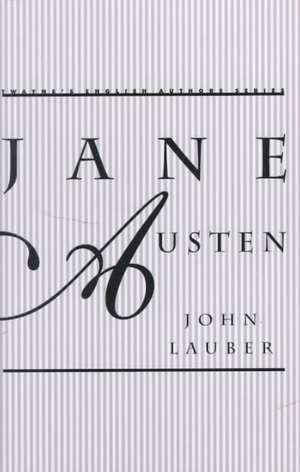English Authors Series: Jane Austen: Twayne's English Authors, cartea 498
Autor John Lauberen Limba Engleză Hardback – 30 iun 1993
Din seria Twayne's English Authors
-
 Preț: 376.19 lei
Preț: 376.19 lei -
 Preț: 461.64 lei
Preț: 461.64 lei -
 Preț: 377.72 lei
Preț: 377.72 lei -
 Preț: 463.17 lei
Preț: 463.17 lei -
 Preț: 375.22 lei
Preț: 375.22 lei -
 Preț: 463.93 lei
Preț: 463.93 lei -
 Preț: 463.55 lei
Preț: 463.55 lei -
 Preț: 462.79 lei
Preț: 462.79 lei -
 Preț: 371.94 lei
Preț: 371.94 lei -
 Preț: 528.27 lei
Preț: 528.27 lei -
 Preț: 372.93 lei
Preț: 372.93 lei -
 Preț: 463.55 lei
Preț: 463.55 lei -
 Preț: 373.47 lei
Preț: 373.47 lei -
 Preț: 485.68 lei
Preț: 485.68 lei -
 Preț: 373.47 lei
Preț: 373.47 lei -
 Preț: 374.62 lei
Preț: 374.62 lei -
 Preț: 372.50 lei
Preț: 372.50 lei -
 Preț: 376.19 lei
Preț: 376.19 lei -
 Preț: 465.13 lei
Preț: 465.13 lei -
 Preț: 375.98 lei
Preț: 375.98 lei -
 Preț: 376.19 lei
Preț: 376.19 lei -
 Preț: 465.89 lei
Preț: 465.89 lei -
 Preț: 464.36 lei
Preț: 464.36 lei -
 Preț: 377.13 lei
Preț: 377.13 lei -
 Preț: 485.90 lei
Preț: 485.90 lei -
 Preț: 376.75 lei
Preț: 376.75 lei -
 Preț: 374.84 lei
Preț: 374.84 lei -
 Preț: 340.23 lei
Preț: 340.23 lei -
 Preț: 485.51 lei
Preț: 485.51 lei -
 Preț: 487.81 lei
Preț: 487.81 lei -
 Preț: 483.38 lei
Preț: 483.38 lei -
 Preț: 461.86 lei
Preț: 461.86 lei -
 Preț: 486.06 lei
Preț: 486.06 lei -
 Preț: 487.25 lei
Preț: 487.25 lei -
 Preț: 487.25 lei
Preț: 487.25 lei -
 Preț: 487.04 lei
Preț: 487.04 lei -
 Preț: 486.49 lei
Preț: 486.49 lei -
 Preț: 487.25 lei
Preț: 487.25 lei -
 Preț: 483.99 lei
Preț: 483.99 lei -
 Preț: 487.42 lei
Preț: 487.42 lei -
 Preț: 487.25 lei
Preț: 487.25 lei -
 Preț: 483.60 lei
Preț: 483.60 lei -
 Preț: 486.49 lei
Preț: 486.49 lei -
 Preț: 484.75 lei
Preț: 484.75 lei -
 Preț: 492.81 lei
Preț: 492.81 lei -
 Preț: 488.19 lei
Preț: 488.19 lei - 23%
 Preț: 500.03 lei
Preț: 500.03 lei -
 Preț: 484.75 lei
Preț: 484.75 lei -
 Preț: 486.28 lei
Preț: 486.28 lei
Preț: 374.45 lei
Nou
Puncte Express: 562
Preț estimativ în valută:
71.66€ • 74.54$ • 59.16£
71.66€ • 74.54$ • 59.16£
Carte indisponibilă temporar
Doresc să fiu notificat când acest titlu va fi disponibil:
Se trimite...
Preluare comenzi: 021 569.72.76
Specificații
ISBN-13: 9780805770148
ISBN-10: 0805770143
Pagini: 176
Dimensiuni: 146 x 224 x 19 mm
Greutate: 0.35 kg
Ediția:New.
Editura: Twayne Publishers
Seria Twayne's English Authors
ISBN-10: 0805770143
Pagini: 176
Dimensiuni: 146 x 224 x 19 mm
Greutate: 0.35 kg
Ediția:New.
Editura: Twayne Publishers
Seria Twayne's English Authors
Textul de pe ultima copertă
In Jane Austen, John Lauber illuminates for the general reader and the student new to her work each of the six peerless novels Austen completed - Sense and Sensibility, Pride and Prejudice, Mansfield Park, Emma, Persuasion, and Northanger Abbey - as well as her two unfinished novels and juvenilia. Lauber clearly lays out the parameters that at least define Austen territory: a desirous and desirable heroine and hero who are destined to marry (though not until they surmount many obstacles); an antihero who is charming but disingenuous and who serves as one of the obstacles to the union of heroine and hero; at least one fool, whose affectation, dullness, or vulgarity makes for comedy and sets off the intelligence and genuineness of the others; and an assortment of provincial ladies and gentlemen. The very presence of a stock of easily defined characters and situations has, since Austen began writing, been some cause for criticism. Lauber reviews the history of the response to Austen over the years: Sir Walter Scott's admiration for the "exquisite touch" that "renders ordinary commonplace things and characters interesting", the nineteenth-century Romantic's disdain for her emotional restraint, the twentieth-century critic's respect for her craftsmanship and fondness for her verve combined with dissatisfaction with her tacit acceptance of the subordinate position of women and of the oppressive moral and social conventions of her time. While thus acknowledging various views of Austen's shortcomings, Lauber is persistent in his appreciation of the reasons for her staying power. Each novel may be equally equipped with heroine, hero, antihero, and fool, but in every instance each such characteris a full-fledged individual; the many fans of Pride and Prejudice's Elizabeth Bennet will find the likes of her in no other novel. Austen's comic wit is irrepressible, her celebrated irony capable of bemused caricature and scornful exposure. Her dialogue is lively and her use of it - at a time when the English novel was barely 100 years old - inventive. Not to be discounted are her perception of human foible and vulnerability and her constancy in valuing genuine love and friendship. Such qualities have stood Austen and her heroines and heros well, making her six "miniatures" abiding companions to many, many readers for nearly two centuries.
